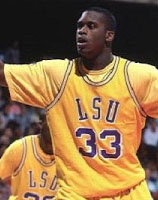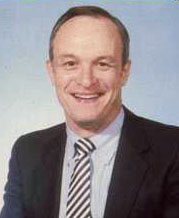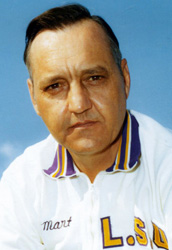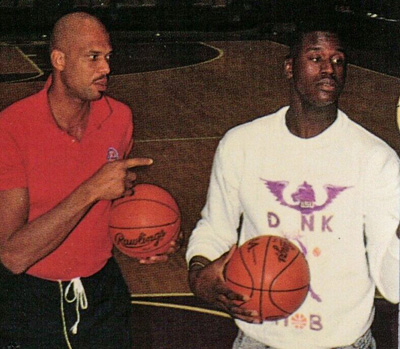LSU Short Story
Shaq's Last Years at LSU - 1
Shaq Uncut, Shaquille O'Neal with Jackie MacMullan (2011)
During the 1990-91 season [Shaq's sophomore year], I was the first player to lead the SEC in scoring, rebounding, field goal percentage, and blocks. ...
We also beat Kentucky and Arizona, which was the number two team in the country at the time. I was finally on the national radar. ...
Coach Brown was on me to make sure I didn't blow it. I was never late for practice, but once in a while I missed a class. One morning I'm sound asleep in my room and there's this loud knock on my door. It's four thirty in the morning. I get out of bed and there's Coach Brown standing there. He said to me, "Did you miss class yesterday?"
I'm half asleep but I say, "Yes, sir."
He says, "Well, then, c'mon, son. Put your shoes on. We're going for a run."
I couldn't believe it. "Right now, Coach?"
"Right now, Shaquille," he said. "Let's go."
After that, I didn't miss too many more classes.


L-R: Shaquille O'Neal in 1990; Coach Dale Brown; Doc Broussard
By the end of my sophomore season we had tied for the SEC regular season championship, and we had one game left before the tournament.
I injured my leg and it was really killing me. All we had to do was beat Mississippi State and we'd win the SEC outright, so Coach Brown says, "What do you think?" I told him I could play, but the truth was there was really something wrong with my leg.
Dale decided to sit me out. "Shaq, I don't want you to risk it," he said.
We lost to Mississippi State and everyone was furious. Coach also sat me out against Auburn in the SEC tournament, and we lost that game, too.
Coach Brown and the trainer, Doc Broussard, really got into it. The trainer thought Dale was trying to be a doctor. But Coach Brown told him, "I'm not. I'm just trying to protect his career. I'd never forgive myself if something happened to Shaquille that stopped him from going to the next level." ...
Broussard was hard-core, a mean bastard. I kept telling him, "Every time I put pressure on my foot, it really hurts." In fact, I had an MRI afterward and they said it was a hairline fracture.
When Coach Brown told him I wasn't playing against Mississippi State, Broussard said, "This is the first time since Pistol Pete Maravich we can win the SEC championship and this wimp won't go. He's just saving himself to go pro."
Dale said, "No, he wouldn't do that."
While they're arguing, our team is on the court warming up. I'm not out there, so the Mississippi State fans started chanting, "Where's your big-lipped African? Where's your big-lipped African?"
Coach Brown went crazy when he heard it. Mississippi State's fans had done this before. The previous year someone wrote an article on Chris Jackson and how he never knew his father, so when our team ran out for warm-ups, they started chanting, "Where's your dad? Who's your dad?"
Dale went to the PA announcer and ordered them to stop. The game hadn't even started and already everyone was all riled up. Coach Brown got on his radio show that night and blasted Mississippi State, their coach, their fans, their president. That's why we loved Coach. He always had our backs.
I was still injured when the NCAA tournament started, but I gave it my best shot. I had 27 points and 16 rebounds, but we lost to UConn. Mike Hansen had gotten mononucleosis, so he wasn't himself, either.
Doc Broussard was wrong about me. I didn't declare for the NBA draft that spring. I wasn't ready. I hadn't even started taking my business classes yet. I knew how to balance a checkbook, but that was about it. I needed to learn about making a living in case this basketball thing didn't work out. I needed an education.
Coach Brown had already started talking to me about playing professionally. He could see I was going to be dominant and eventually go to the NBA, so he started exposing me to all sorts of different people. I remember one morning I was asleep in my dorm room and I heard some noise and I work up and I was kind of fuzzy, but I see this old guy talking to me, and it's John Wooden. He was friends with Dale Brown, and he came to talk to me about teamwork and the pride of playing for one's school. I think what he was trying to do was to convince me to stay in college for all four years. I certainly respected Coach Wooden and everything he stood for, but I still had to do what I had to do.
Kareem Abdul Jabbar and Shaquille O'Neal
Another time Dale brought in Kareem to teach me a sky hook. He brought in Bill Walton, who later told reporters I reminded him of Charles Barkley because of my "raw power." My father heard about these visits and wanted to know why Dale was encouraging me to shoot a hook shot.
"He's a power player," my dad told my coach. "I want him to dunk."
Dale got me on the phone with Julius Erving, my childhood idol. He brought Olympic sprinter Carl Lewis in. Coach Brown loved Carl Lewis. Carl told us, "You know, growing up we've all got dreams and we all want to be All-Americans, but wanting that and willing that to happen are two completely different things."
I was an All-American after my sophomore year. The Associated Press and UPI named me National Player of the Year, but I didn't win the Wooden Award or the Naismith Award. Larry Johnson of Nevada-Las Vegas won both of those, so he was on my hit list.
Coach Brown was on me to make sure I didn't blow it. I was never late for practice, but once in a while I missed a class. One morning I'm sound asleep in my room and there's this loud knock on my door. It's four thirty in the morning. I get out of bed and there's Coach Brown standing there. He said to me, "Did you miss class yesterday?"
I'm half asleep but I say, "Yes, sir."
He says, "Well, then, c'mon, son. Put your shoes on. We're going for a run."
I couldn't believe it. "Right now, Coach?"
"Right now, Shaquille," he said. "Let's go."
After that, I didn't miss too many more classes.



L-R: Shaquille O'Neal in 1990; Coach Dale Brown; Doc Broussard
I injured my leg and it was really killing me. All we had to do was beat Mississippi State and we'd win the SEC outright, so Coach Brown says, "What do you think?" I told him I could play, but the truth was there was really something wrong with my leg.
Dale decided to sit me out. "Shaq, I don't want you to risk it," he said.
We lost to Mississippi State and everyone was furious. Coach also sat me out against Auburn in the SEC tournament, and we lost that game, too.
Coach Brown and the trainer, Doc Broussard, really got into it. The trainer thought Dale was trying to be a doctor. But Coach Brown told him, "I'm not. I'm just trying to protect his career. I'd never forgive myself if something happened to Shaquille that stopped him from going to the next level." ...
Broussard was hard-core, a mean bastard. I kept telling him, "Every time I put pressure on my foot, it really hurts." In fact, I had an MRI afterward and they said it was a hairline fracture.
When Coach Brown told him I wasn't playing against Mississippi State, Broussard said, "This is the first time since Pistol Pete Maravich we can win the SEC championship and this wimp won't go. He's just saving himself to go pro."
Dale said, "No, he wouldn't do that."
While they're arguing, our team is on the court warming up. I'm not out there, so the Mississippi State fans started chanting, "Where's your big-lipped African? Where's your big-lipped African?"
Coach Brown went crazy when he heard it. Mississippi State's fans had done this before. The previous year someone wrote an article on Chris Jackson and how he never knew his father, so when our team ran out for warm-ups, they started chanting, "Where's your dad? Who's your dad?"
Dale went to the PA announcer and ordered them to stop. The game hadn't even started and already everyone was all riled up. Coach Brown got on his radio show that night and blasted Mississippi State, their coach, their fans, their president. That's why we loved Coach. He always had our backs.
I was still injured when the NCAA tournament started, but I gave it my best shot. I had 27 points and 16 rebounds, but we lost to UConn. Mike Hansen had gotten mononucleosis, so he wasn't himself, either.
Doc Broussard was wrong about me. I didn't declare for the NBA draft that spring. I wasn't ready. I hadn't even started taking my business classes yet. I knew how to balance a checkbook, but that was about it. I needed to learn about making a living in case this basketball thing didn't work out. I needed an education.
Coach Brown had already started talking to me about playing professionally. He could see I was going to be dominant and eventually go to the NBA, so he started exposing me to all sorts of different people. I remember one morning I was asleep in my dorm room and I heard some noise and I work up and I was kind of fuzzy, but I see this old guy talking to me, and it's John Wooden. He was friends with Dale Brown, and he came to talk to me about teamwork and the pride of playing for one's school. I think what he was trying to do was to convince me to stay in college for all four years. I certainly respected Coach Wooden and everything he stood for, but I still had to do what I had to do.

Kareem Abdul Jabbar and Shaquille O'Neal
"He's a power player," my dad told my coach. "I want him to dunk."
Dale got me on the phone with Julius Erving, my childhood idol. He brought Olympic sprinter Carl Lewis in. Coach Brown loved Carl Lewis. Carl told us, "You know, growing up we've all got dreams and we all want to be All-Americans, but wanting that and willing that to happen are two completely different things."
I was an All-American after my sophomore year. The Associated Press and UPI named me National Player of the Year, but I didn't win the Wooden Award or the Naismith Award. Larry Johnson of Nevada-Las Vegas won both of those, so he was on my hit list.
To be continued ...